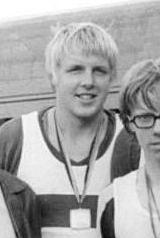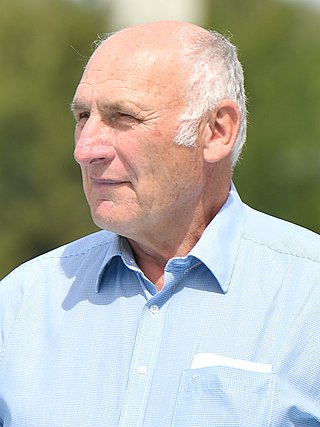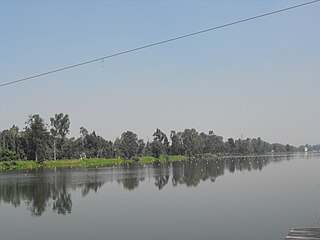
Alf John Hansen is a retired rower from Norway. Early in his career, he received two Norwegian sport awards shared with his brother Frank. Towards the end of his career in 1990, he was the inaugural recipient of the Thomas Keller Medal, the highest honour in rowing. His international rowing career spanned more than two decades.

Dudley Leonard Storey was a New Zealand rower who won two Olympic medals.
Warren Joseph Cole was a New Zealand rower who won an Olympic gold medal at the 1968 Summer Olympics in Mexico City.
Simon Charles Dickie was a New Zealand rowing cox who won three Olympic medals.

Igor Aleksandrovich Rudakov is a Russian former coxswain who competed for the Soviet Union in the 1960, 1964, 1968, and in the 1972 Summer Olympics.

Siegfried Brietzke is a German rower. He competed for East Germany, first in coxless pairs, together with Wolfgang Mager, and then in coxless fours. In these events he won Olympic gold medals in 1972, 1976 and 1980, as well as four world championships in 1974–1979.

Hans-Johann Färber is a German rower who competed for West Germany in the 1968 Summer Olympics, 1972 Summer Olympics and in the 1976 Summer Olympics.

Gerhard Auer was a German rower who competed for West Germany in the 1972 Summer Olympics.

Alois Bierl is a German rower who competed for West Germany in the 1972 Summer Olympics.
Uwe Benter is a German coxswain who competed for West Germany in the 1972 Summer Olympics.
Klaus-Dieter Ludwig, known as Lucky in rowing circles, was a German coxswain who competed for East Germany in the 1972 Summer Olympics and in the 1980 Summer Olympics. He had a long rowing career and competed on the international stage for 19 seasons, retiring aged 41.
Peter Funnekötter is a German rower who competed for West Germany in the 1972 Summer Olympics.
Peter Niehusen is the only sportsman to have won international medals as both a coxswain and a rower. He won two gold medals and three bronze medals at the European and World Championships and the 1976 Summer Olympics in Montreal.

The men's coxed four competition at the 1972 Summer Olympics in Munich took place from 27 August to 2 September at the Olympic Reggatta Course in Oberschleißheim. There were 14 boats from 14 nations, with each nation limited to a single boat in the event. The event was won by West Germany; it was the nation's first medal as a separate team, but the third time in four Games that a West German crew had won gold. East Germany repeated as silver medallists, though with a new crew. Bronze went to Czechoslovakia, the nation's first medal in the men's coxed four since 1952.

The men's coxed four rowing competition at the 1980 Summer Olympics took place at Krylatskoye Sports Complex Canoeing and Rowing Basin, Moscow, Soviet Union. The event was held from 20 to 27 July. There were 12 boats from 12 nations, with each nation limited to a single boat in the event. The event was won by East Germany, the nation's first victory after three consecutive silver medals since it began competing separately in 1968. Defending champions the Soviet Union finished second, while Poland's bronze medal was the first medal in the men's coxed four for that nation since 1932. Twin brothers Ullrich and Walter Dießner became the sixth and seventh men to earn two medals in the event, as they had also competed on the 1976 East German silver medal team.

The men's coxed four competition at the 1968 Summer Olympics took place at Virgilio Uribe Rowing and Canoeing Course, Mexico City, Mexico. It was held from 13 to 19 October and was unexpectedly won by the team from New Zealand, which secured the country its first Olympic rowing gold medal. Thirteen teams from 13 nations attended the competition. East Germany earned its first medal in its debut in the event, taking silver. Switzerland took bronze, its first medal in the men's coxed four since 1952.

The men's coxed four (M4+) competition at the 1976 Summer Olympics took place at the rowing basin on Notre Dame Island in Montreal, Quebec, Canada. It was held from 18 to 25 July and was won by the team from Soviet Union. There were 14 boats from 14 nations, with each nation limited to a single boat in the event. The victory was the Soviet Union's first medal in the men's coxed four. East Germany took its third consecutive silver medal, with entirely different crews each time. The defending champion West Germany received bronze this time. Hans-Johann Färber, the only rower from the 1972 gold medal team to return, became the fifth man to earn multiple medals in the event.

The men's eight competition at the 1976 Summer Olympics took place at the rowing basin on Notre Dame Island in Montreal, Quebec, Canada. It was held from 18 to 25 July and was won by the team from East Germany. It was East Germany's first victory in the event, improving on a bronze medal in 1972. The defending champions, New Zealand, switched places with the East Germans, taking bronze in 1976. Between them was Great Britain, taking its first men's eight medal since 1948. There were 11 boats from 11 nations, with each nation limited to a single boat in the event.

The 1972 New Zealand eight was a team of Olympic gold medallists in rowing from New Zealand, having previously won the 1971 European Rowing Championships. At the time, the eight was regarded as the blue ribbon class of rowing, and the sport still had amateur-status in New Zealand, unlike many other nations competing in rowing. After a disappointing Olympic performance at the 1968 Summer Olympics by the New Zealand eight, national selectors Rusty Robertson, Don Rowlands, and Fred Strachan were tasked with assembling a new crew. Robertson was also the team's coach. The next time a New Zealand eight competed was at the 1970 World Rowing Championships, where they came third. The team was once again significantly changed for the next rowing season, with the 1971 edition of the European Rowing Championships and other international regattas beforehand seen as the ultimate test for the 1972 Summer Olympics. The team put up an impressive performance, beat the highly favoured East German eight, and became European champion; at the time the win was regarded as holding world championship status. No further changes were made to the team, not even their seating position, for the 1972 season. Despite a shoe-string budget, financial constraints, and all rowers working part-time, the 1971 success was repeated and the team won Olympic gold in Munich. The president of the International Olympic Committee (IOC), Avery Brundage, was a zealous advocate of amateurism; he was so impressed by the New Zealand performance that he insisted on handing out the gold medals himself. During the medal ceremony, much to almost everybody's surprise, "God Defend New Zealand" was played instead of the national anthem, "God Save the Queen". It was the impetus for a campaign to make "God Defend New Zealand" the New Zealand anthem, and in 1977 it was gazetted as having equal status to the traditional anthem.











